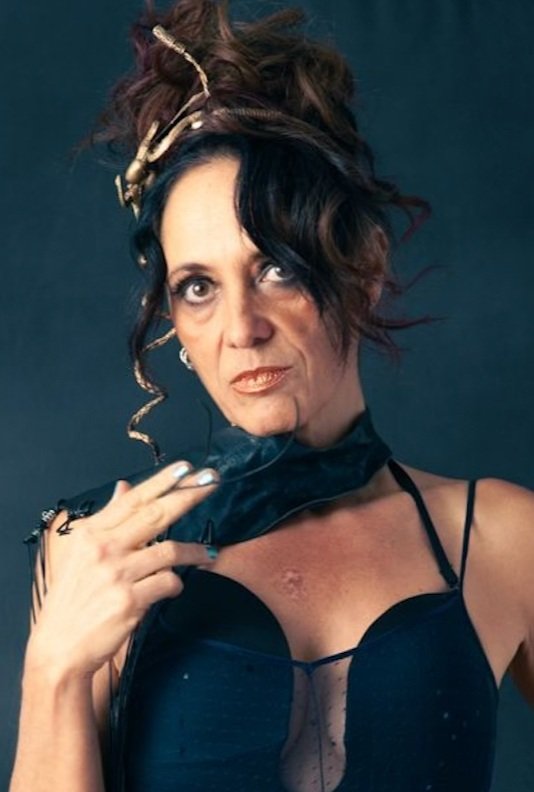I did it for Penelope. Penelope and the Geese is an hourlong interdisciplinary performance piece by an all-female company. Composed by Milica Paranosic with a libretto by Cheri Magid, Penelope gives voice to the female characters in The Odyssey—and only the female characters—who were under-explored in the original text. With direction by Kristine McIntyre and set design/installations by Millicent Young, Penelope delves into thorny questions about love, desire, and absence.
Penelope And the Geese largely takes place in Penelope’s mind as she remembers, feels, loves, despairs, celebrates, and ultimately decides to tell Odysseus the truth about her life in his twenty-year absence. While she yearned constantly for his return, she also took many lovers, and wove locks of their hair into a blanket that is hers alone. Goddesses, demigoddesses, and slaves join Penelope in singing of their own loves and losses and the way the gods have conspired to contain them.
Penelope is sung by one mezzo-soprano (Penelope) and three or six sopranos (chorus and assorted female characters from The Odyssey). It is scored for harp, flute and cello—and those instruments' ancient twins, the Greek lyre, Greek aulos, and Serbian gusle. This juxtaposition of new and traditional instruments with female voices creates a sound that is ancient, modern, unfamiliar and timeless all at once.'
Photo: Peter Dressel
-
ComposerMilica Paranosic is a Serbian-born composer, designer and interdisciplinary artist who lives in Harlem, NYC. Her music has been described as “amazing and astonishing” by The New York Times, “like liquor-filled pralines,” by the Berliner Morgenpost and she herself as a “...free-wheeling performance-art-type cat“ by the Village Voice. Her work was supported, commissioned, and presented by organizations such as LMCC, NYSCA, ASCAP, Whitney Museum, New Dramatists, HERE Arts Center, American Composers Orchestra, LVMH Moët Hennessy/Louis Vuitton, VisionIntoArt, Buglisi Dance Theater, Joyce Theater, Symphony Space, Zankel Hall/Carnegie, Lincoln Center, Bohemian National Hall among others. Intercontinental highlights include BEMUS (Serbia), EtnaFest (Italy) and UFBA (Brazil). Milica has an MM in composition from The Juilliard School where she started the music tech department and co-founded the international festival Beyond the Machine. She is also the founder of the Harlem based Paracademia –a non-profit for music and multimedia. www.milicaparanosic.com www.paracademia.org
Photo: Charise Isis
-
Cheri Magid is currently writing a scripted podcast, The Classics, which will star Sarah Jessica Parker, for Audible UK. Her film/play A Poem and a Mistake was presented by Australian Centre for Contemporary Art in Melbourne, was featured in the BBC Radio 4 podcast Modern Metamorphoses, and was performed live as a theatre piece at Delaware Rep. The Sydney Morning Herald says of A Poem, “You’ll never think of classical literature again without these women coming into your head.” Cheri’s music-theatre performance piece Penelope and the Geese, composed by Milica Paranosic, was performed at The Museum of Asian Art in Corfu, Greece and aired on Autogram, Radio Belgrade 2 in Belgrade, Serbia. Cheri’s plays have been seen at Primary Stages, New Georges, The New Group, The Women’s Project, Rattlestick, South Coast Rep, People’s Light and Theatre Company, StudioTenn, The Road Theatre Company and Cincinnati Playhouse among others. She also wrote for the Emmy-award-winning children’s television show Arthur and is an Assistant Arts Professor in Dramatic Writing at New York University.
-
Stage director Kristine McIntyre has more than 100 operas to her credit with a focus on new, contemporary and American works. Recent productions include the world premiers of Hometown to the World at the Santa Fe Opera and Town Hall, NYC, A Thousand Acres at Des Moines Metro Opera, and Galaxies in Her Eyes for the Culp Planetarium; the film Unknown for UrbanArias, based on the song cycle by Shawn Okpebholo and Marcus Amaker, a technologically-innovative immersive production of Bluebeard's Castle; many revivals of her film-noir-inspired Don Giovanni; and Emmy-award winning productions of Billy Budd and Manon with Iowa Public Television. Kristine has taught and directed in the young artist training programs at Houston Grand Opera, Chicago Lyric Opera, San Francisco Opera, Portland Opera, Pittsburgh Opera and The Santa Fe Opera. She regularly mentors young directors, composers and librettists and serves on the steering committee of the Women's Opera Network at Opera America.
http://www.knmcintyre.com/
-
Millicent Young is a studio artist focusing on sculpture, installation, and three-dimensional projects merging sound, poetry, and movement. Young has received two Professional Artist Fellowships from the Virginia Museum of Fine Arts and three grants from the Foundation for Contemporary Arts (NYC). Since 1995, her work has received numerous awards from curators affiliated with the National Gallery / Smithsonian, Hirshhorn, Dia, New, Guggenheim, and Whitney Museums in juried exhibitions. It received a top award at the Biennale of Contemporary Art in Florence, Italy (2005). Her work is in included in the National Museum of Women in the Arts collection. Young's work was featured on the cover of Sculpture Magazine (March/April 2020). In 2022 she received the Distinguished Alumni Award from the School of Art, Design, and Art History at James Madison University. Since 2018. Young has had seven solo exhibitions in New York and Virginia. Upcoming work will be featured at DOX Center for Contemporary Art Prague and a twenty-year solo retrospective in New York in September.
Penelope: Hai Ting Chinn
Circe: Nicole Cherecwich
Athena: Joy Jan Jones
Aphrodite: Kimberly Chatterjee
Calypso: Sharon Harms
Nausicaa: Camille Harris
The Sirens: Lynne Procope
Harp/Lyre: Mia Theodoratus
Cello/Gusle: Jennifer DeVore
Flute/Aulos: Margaret Lancaster
Conductor: Mila Henry
Listen

Specs
Running time: 1 hour
Personnel: 1 mezzo soprano, 3 or 6 sopranos
3 instrumentalists: harp/lyre, flute/aulus, cello/Serbian gusle
Penelope and the Geese can also be performed as a thirty-five minute song cycle, with 1 mezzo soprano, 1-4 sopranos and 3 instrumentalists: harp/lyre, flute/aulus, cello/Serbian gusle.







